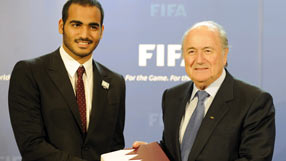Qatar faces up to World Cup challenges
DOHA - "Are you sure you wouldn't like a beer or a glass of wine?"

That question is not normally heard at lunchtime in Islamic Qatar but the drinks flowed freely while FIFA's inspection team toured Doha this week to evaluate the country's chances of hosting the 2022 World Cup.
The tiny Gulf Arab state is eager to display a liberal and welcoming image to inspectors and media, though its $4 billion bid for the tournament has been dismissed by many as unrealistic given its conservative social mores and lack of football culture.
While it has become more Westernized in recent years, it is still a relatively closed Islamic nation with most Qatari women covered head-to-toe in long, black abayas.
The sale of alcohol - as well as the often rowdy behaviour of World Cup fans from around the world - present significant challenges in an Islamic country where public drunkenness is prohibited.
"Qatar is a country with a conservative culture, however we are also a country that respects its guests and visitors," said bid communications director Nasser Al Khater. "We will have dedicated zones where alcohol will be served."
Still, doubts linger over whether Qatar can handle an influx of about 400,000 fans, many on a tight budget.
"The problem is that you have nothing low-end here. This is not a cheap place for tourists. Everything is five star," one expat resident of Doha said.
Get FourFourTwo Newsletter
The best features, fun and footballing quizzes, straight to your inbox every week.
"Where are they going to put all of these people?"
Qatar, which currently has about 50,000 hotel rooms, will need 60,000 to meet the requirements of world football's governing body FIFA. Bid leaders have promised 95,000 rooms would be available by 2022.
Hosting a World Cup would require capacity for 32 teams, their travelling fans and a huge media presence.
Qatar has launched a massive spending programme in recent years to build infrastructure needed to accommodate its rapidly expanding population, now estimated at 1.6 million. Much of the capital city Doha resembles a construction site.
Plans are in place to complete a metro system connecting every stadium by 2017, with each stadium no further than one hour apart, according to bid leaders.
FEROCIOUS SUMMER
If Qatar wins the right to host the event it would be the first major global sporting event staged in the Middle East.
"From a commercial point of view it would do very well here because of the time zones. The biggest spectator audience comes from Europe, South America and Asia," said Steven Humphrey, head of construction consultancy Davis Langdon's Qatar office.
"The issue is the heat."
Ferocious summer temperatures that can soar to above 50 degrees Celsius are likely to deter some visiting fans, but organizers say they have already tackled the issue by constructing climate-controlled, zero-carbon emitting stadiums.
And for the world's largest exporter of liquefied natural gas, money is no object. The country's economy is expected to grow by 16 percent this year.
"The biggest thing is that there is so much to be done," Humphrey said. "Money is not an issue. Getting a plan in place is an issue."
F
